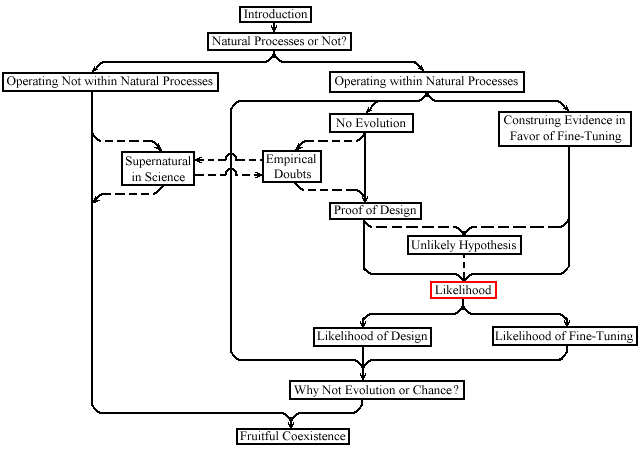

LikelihoodYou have arrived here by one of two possible routes: either from the argument about the likelihood of intelligent design or creation over chance in the seeming fine-tuning of the universal constants, or from the argument about the likelihood of intelligent design or creation over evolution in producing the complex adaptations we see.In both cases, the argument is that, given the evidence at hand, creation by God or intelligent design is more likely than chance or evolution to have happened, given what we observe in the world, which is a likelihood argument. The likelihood of a hypothesis H, given that we observe O, is not the same as the probability of H given O; rather, the likelihood of H given O is defined as the probability of observing O, given the truth of hypothesis H: P(O|H).In our case, this would be the probability that we observe what we do, given the truth of Intelligent Design or Creationism. So the relevant question here is: what is the probability that we would observe what we do, given the truth of the hypothesized existence of an intelligent designer or a creator God? Now, there are problems with evaluating this probability in an absolute sense because it depends mathematically on the prior probability of H, which may be difficult to come by objectively (Sober 2002a, 299). However, these problems can be avoided by considering the likelihood of one hypothesis relative to another, given our observation of O. In this way, observing O may be said to discriminate between hypotheses, conferring a higher likelihood on one hypothesis H1 than H2 when: P(O|H1) > P(O|H2).Thus we ask, is the probability that we would observe O, given the truth of H1, greater than the probability that we would observe O, given the truth of H2? In effect, which hypothesis makes O more probable? Bear in mind that, even if one hypothesis is more likely than another, given O, nothing whatsoever can be concluded about the absolute likelihood that that hypothesis is true, for two reasons. Reason 1: one hypothesis may be more likely than another based on O1, but really a full consideration of the problem requires access to all relevant observations O2, O3, ... On. Reason 2: the fact that H1 is more likely than H2, given O, does not exclude the possibility that there is a hypothesis H3 which is more likely than either H1 or H2, unless one can show that H1 and H2 exhaust the possible hypotheses.
At this point the discussion of the fine-tuning argument and the argument against evolution diverge. For the continuation of the discussion of the fine-tuning argument, go to Likelihood of Fine-Tuning. For the continuation of the discussion of the argument against evolution, go to Likelihood of Design.

|
© David Montalvo 2004
updated 3-22-04